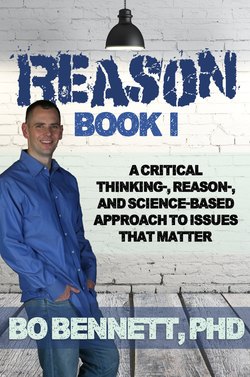Читать книгу Reason: Book I - Bo Bennett - Страница 19
На сайте Литреса книга снята с продажи.
Why Trust Science When It Keeps Changing Its Mind?
Оглавление“In science it often happens that scientists say, ‘You know that’s a really good argument; my position is mistaken,’ and then they actually change their minds and you never hear that old view from them again... . I cannot recall the last time something like that has happened in politics or religion.” - Carl Sagan, 1987 CSICOP address
You should trust science as a process for separating fact from fiction because of its flexibility to update theories and findings based on new information—and because it is the best method we have. The idea that “science keeps changing its mind” is based more on the public’s perception of science that actual science. There are several reasons for this.
First, a possible explanation as to why the idea that science is less trustworthy because it adjusts its claims in response to new information could have its roots in religious dogma. In the United States, over 80% of the population identifies with some religion3. The majority of these practitioners believe that certain and unchanging knowledge can be obtained from inerrant holy books, Papal infallibility, or divine inspiration. Compared to that, any form of probability-based knowledge, such as the kind obtained by the scientific method, is inferior. In many cases, science and religion can co-exist in harmony, but in some cases, they can’t. This is one of those cases. The belief in certain and unchanging knowledge from inerrant holy books, Papal infallibility, or divine inspiration not only undermines the probabilistic world in which we live, but leads to a refusal to accept data that contradicts what is believed to be “divine Truth” (there are too many resources that demonstrate the problems with “divine Truth,” so I will not go into that here).
Scientists change their views based on new information—this is the foundation of learning. Science is a process of discovery. As we learn more, that new information is used to update existing findings, therefore, converging on what we might refer to as a convergence of data or a scientific consensus. According to Wikipedia, a scientific consensus is “the collective judgment, position, and opinion of the community of scientists in a particular field of study. Consensus implies general agreement, though not necessarily unanimity.” In science, specific views change frequently, and general consensuses change occasionally. Strong scientific consensuses on well-established theories rarely change but are still provisional. To the non-scientist, there isn’t much difference between a scientific view and a scientific consensus, but in the field of science, the difference is as drastic as the difference between a 6000-year-old and 13.8 billion-year-old universe.
People (thanks to the media) often latch onto specific studies and equate those findings with science “making up its mind.” The field of science shares some of this responsibility—science communication is and has always been a problem. The media need viewers and sensationalize and exaggerate findings and conclusions when writing about a scientific discovery, often in the form of inferring a much greater level of confidence or even certainty when the findings are actually much more conservative. In the figure below, we see a blogger’s interpretation of the headline, then the actual headline from a scientific source. Notice how the blogger not only moved from a may be to an is, but also greatly embellished the findings. Another example of this can be found in a recent study on life after death.
When an outlier study is published, this is often presented by the media or inferred by the public as science changing its mind, when in reality it is just another of many studies conducted in an attempt to improve our collective understanding. Outliers are studies that present findings significantly different from the norm. Statistical probability alone will produce about 1 of these type of studies for every 20 conducted. Think of an outlier as a drunk celebrity that gets caught on video streaking. This outlier is far more interesting than the other studies (the sober and clothed celebrities) and has a much greater shock value. When a multitude of studies clearly converge on a set of findings or conclusion and the public is aware of this, nobody wants to hear about yet another study that confirms what they already know (that won’t get clicks). Thanks to the availability bias, the public’s perception of confidence among scientists is radically different from what it actually is.
Due to poor science communication, the public’s view on science is more often associated with popular TV doctors and Internet websites that are pseudo-scientific, outright fraudulent, and/or offer potentially deadly advice. These “rebels” often obtain their notoriety by holding contrarian positions that play well to the public’s optimism bias, desire for instant gratification and easily digestible information. The loud voices of a few drown out the many voices sharing unpopular, complex, scientific facts.
People tend to confuse scientific debate about fine points of a theory with debate about the theory itself. Science is a process that thrives on scholarly debate. This debate is more prevalent in complex theories, but challenges to a theory aren’t suggestive of a theory being “wrong;” they are meant to point out gaps in the theory that should be addressed.
When we are forced to adhere to dogma, authority, or the idea that we cannot be wrong, we explain away, attempt to discredit, or ignore new information that would cause us to reevaluate our conclusions. In science, all findings are provisional and subject to revision based on new information. Using the scientific method, our conclusions may change based on updated information and new discoveries. This is the process of learning, and as it has been said, this is not a bug in science; it is a feature.
